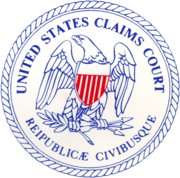| Paul v. United States | |
|---|---|
 | |
| Court | United States Claims Court |
| Full case name | Frederick Paul v. United States |
| Decided | April 23, 1990 |
| Citation | 20 Cl.Ct. 236 (1990) |
| Case history | |
| Prior actions | Arctic Slope Native Ass'n v. Paul, 609 P.2d 32 (Alaska, 1980); Paul v. United States, No. C77-399V, (W.D.Wash); Paul v. Andrus, 639 F.2d 507 (9th Cir.1980); Paul v. United States, 687 F.2d 364, 231 Ct.Cl. 445 (1982), cert. denied, 461 U.S. 927, 103 S.Ct. 2086, 77 L.Ed.2d 297 (1983); Jackson v. United States, 485 F.Supp. 1243 (D.Alaska, 1980). |
| Subsequent actions | 21 Cl.Ct. 758 (1990) (affirming HOR in part and finding that any payment would be a gratuity). |
| Court membership | |
| Judge sitting | Kenneth R. Harkins |
| Case opinions | |
| That Paul did not have a legal or equitable claim to the money and if Congress did grant him the money, it would be as payment of an equitable claim and not as a gratuity. | |
Paul v. United States, 20 Cl.Ct. 236 (1990), was a Congressional reference case brought before the United States Claims Court as a result of Senate Resolution 187 of the 100th Congress' 1st Session in 1988, which referred the proposed private bill, S. 966 to the court for a report on whether Frederick Paul's claim was a legal, equitable, or gratuitous claim and what amount was legally or equitably due to him by the United States.[1] Paul claimed he was due additional money from the government for his work with the native Inuit of Alaska that led to the passage of the Alaska Native Claims Settlement Act in 1971 and the creation of the modern borough system of local government in Alaska.
The hearing officer held that while Paul did not have a legal or equitable claim to the money, if Congress did grant him the money, it would be as payment of an equitable claim and not as a gratuity.[2] The review panel to the case agreed that there was no legal or equitable claim, but held that any payment would be a gratuity. Subsequently, Congress failed to act on the proposed bill before Mr. Paul's death in 1994.[3]